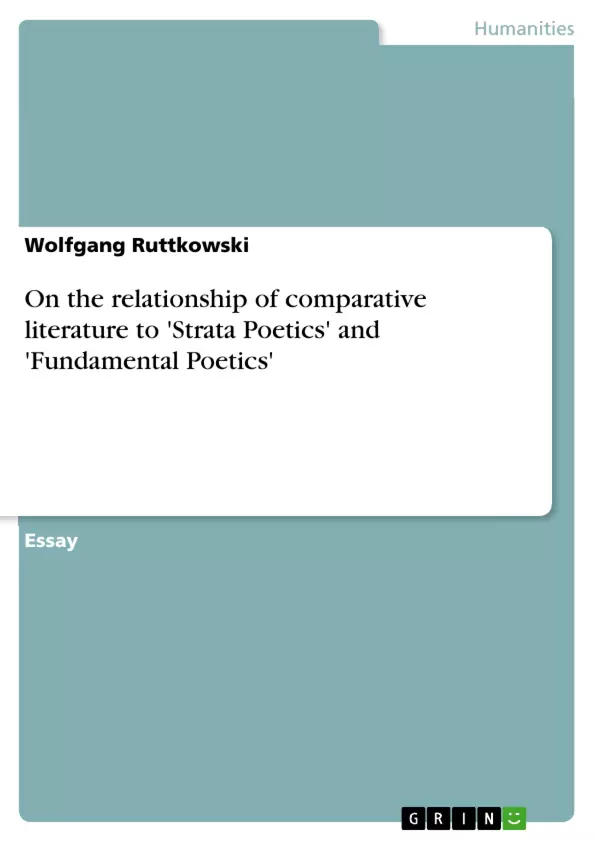Ever since their "declaration of independence" from the national literary sciences, about a century ago, comparatists have been desperately groping for a comprehensive theory, broad enough to accommodate not only their investigations into the development and functioning of literary genres, but also their pet subject of the "mutual elucidation of the arts".
These reflections are to be understood as an attempt to examine some ideas and models produced mainly in Germany after the last world war. These will be examined for their usefulness in providing such a comprehensive theory, or at least a base for the construction of such a theory. Two of these models seem to be opposed to each other ("Fundamentalpoetik" and the sociological approach). However, I hope to show that in reality they complement each other. The third model ("Strata Poetics") is still widely unknown, but could, in my view, combine the two others into a unified theory. (In: Acta Humanistica, Humanities S. No. 27, March 2000, 221-242)
Inhaltsverzeichnis (Table of Contents)
- Abstract
- Comparative Literature in Need of a Unifying Theory
- Constants are Indispensable for Comparison
- Literary Genres Are Such Constants
- Comparative Literature Employs Meta-Criticism
- The Historical and the Systematical Approach Towards Genre-Studies
- The English, French, and German Attitude Towards Genre-Classifications
- \"Fundamental Poetics\"
- Criticism of \"Fundamental Poetics\"
- A Proposed Order for Generic Terms....
- Connection Between \"Basic Attitudes\" and Linguistic Features
- \"Fundamental Poetics\" and \"Strata Poetics\"
- Analogy Between the Aims of Comparative Literature and Structural Linguistics
- ANNOTATIONS
Zielsetzung und Themenschwerpunkte (Objectives and Key Themes)
This article examines the fundamental assumptions of various literary disciplines, including Comparative Literature, "Strata Poetics," and "Fundamental Poetics," highlighting their shared interests and outlining a unifying theory for Comparative Literature. The author argues that a comprehensive theory of Comparative Literature requires establishing order within the categories of genre poetics, particularly through the lens of literary genres as constants for comparison. The piece further explores the development of genre poetics from a normative to a descriptive approach, examining its evolution in various historical and sociological contexts.
- The need for a unifying theory in Comparative Literature
- The role of literary genres as constants for comparison
- The historical and systematical approaches to genre-studies
- The influence of "Fundamental Poetics" and "Strata Poetics" on genre classification
- The connection between "Basic Attitudes" and linguistic features in literary analysis
Zusammenfassung der Kapitel (Chapter Summaries)
- Abstract: This section presents the key arguments of the article, emphasizing the need for a unifying theory in Comparative Literature and the importance of genre poetics for achieving this goal.
- Comparative Literature in Need of a Unifying Theory: The author discusses the ongoing search for a comprehensive theory in Comparative Literature, highlighting the need for a framework that encompasses both genre studies and the "mutual elucidation of the arts."
- Constants are Indispensable for Comparison: This section introduces the concept of constants as essential elements for comparison, proposing that literary genres serve as crucial constants in Comparative Literature.
- Literary Genres Are Such Constants: The author explores the significance of literary genres as constants for comparison, emphasizing their role in analyzing the influence of specific works across language barriers.
- Comparative Literature Employs Meta-Criticism: The article defines metacriticism in contrast to intrinsic criticism and explains how Comparative Literature employs metacritical approaches, particularly in relation to the social determination of genres.
- The Historical and the Systematical Approach Towards Genre-Studies: This section examines the two primary approaches to genre-studies—historical and systematical—and their complementary nature in Comparative Literature.
- The English, French, and German Attitude Towards Genre-Classifications: The author explores the differing perspectives on genre classifications in English, French, and German literary traditions, highlighting the emphasis on systematization in the German tradition.
Schlüsselwörter (Keywords)
This article focuses on the crucial concepts of comparative literature, genre poetics, "Fundamental Poetics," and "Strata Poetics," highlighting their influence on genre classification and analysis. The text also emphasizes the role of literary genres as constants for comparison, the relationship between "Basic Attitudes" and linguistic features, and the importance of metacriticism in the field of Comparative Literature. The work explores the historical and systematical approaches to genre studies, examining the distinct perspectives of English, French, and German literary traditions.
Frequently Asked Questions
What is the main challenge for Comparative Literature discussed?
The field is searching for a comprehensive, unifying theory broad enough to cover genre development and the "mutual elucidation of the arts."
What are "Fundamental Poetics" and "Strata Poetics"?
They are literary models; the author suggests "Strata Poetics" could unify the sociological approach and "Fundamental Poetics" into a single theory.
Why are literary genres considered "constants"?
Genres serve as indispensable constants for comparison, allowing researchers to analyze the influence of works across different languages and cultures.
How does the German tradition differ in genre classification?
The German tradition tends to emphasize systematization more than the English or French literary traditions.
What is the role of meta-criticism in this context?
Comparative Literature employs meta-criticism to look at the social determination of genres, moving beyond simple intrinsic criticism.
Is there a link between linguistics and poetics here?
Yes, the text explores the connection between "Basic Attitudes" in literature and specific linguistic features, drawing an analogy with structural linguistics.
- Quote paper
- Dr. Wolfgang Ruttkowski (Author), 2000, On the relationship of comparative literature to 'Strata Poetics' and 'Fundamental Poetics', Munich, GRIN Verlag, https://www.grin.com/document/81125



